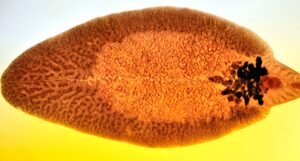Liver Fluke

Liver Fluke (Fasciola hepatica) is a flat, leaf-shaped parasite that primarily inhabits the livers of grazing animals, particularly sheep and cattle, though it can also affect horses.
The populations of flukes are significantly influenced by temperature and moisture levels from the current and previous years, with animals in wetter and warmer environments being at greater risk.
Adult flukes release eggs onto the pasture. Under damp and warm conditions, these eggs hatch into larvae (miricidium), which can then infect mud snails. Inside the snail, the larvae multiply and eventually exit in a tadpole-like form (cercaria), which encysts on grass, developing into metacercaria. When grazing animals consume the cysts, they become immature flukes that burrow into the liver. The liver fluke matures in the bile ducts, feeding on the host’s blood, and begins producing eggs approximately 8-10 weeks post-infection.
SYMPTOMS OF LIVER FLUKE
– Anemia resulting from the fluke’s blood feeding
– Liver damage
– Weight loss – Reduced growth rates in young animals
– Occasional diarrhea
TREATMENT OF LIVER FLUKE
Currently, there are no approved medications for treating liver fluke infections in horses. Treatment can only be administered through off-label prescriptions by a veterinarian.
